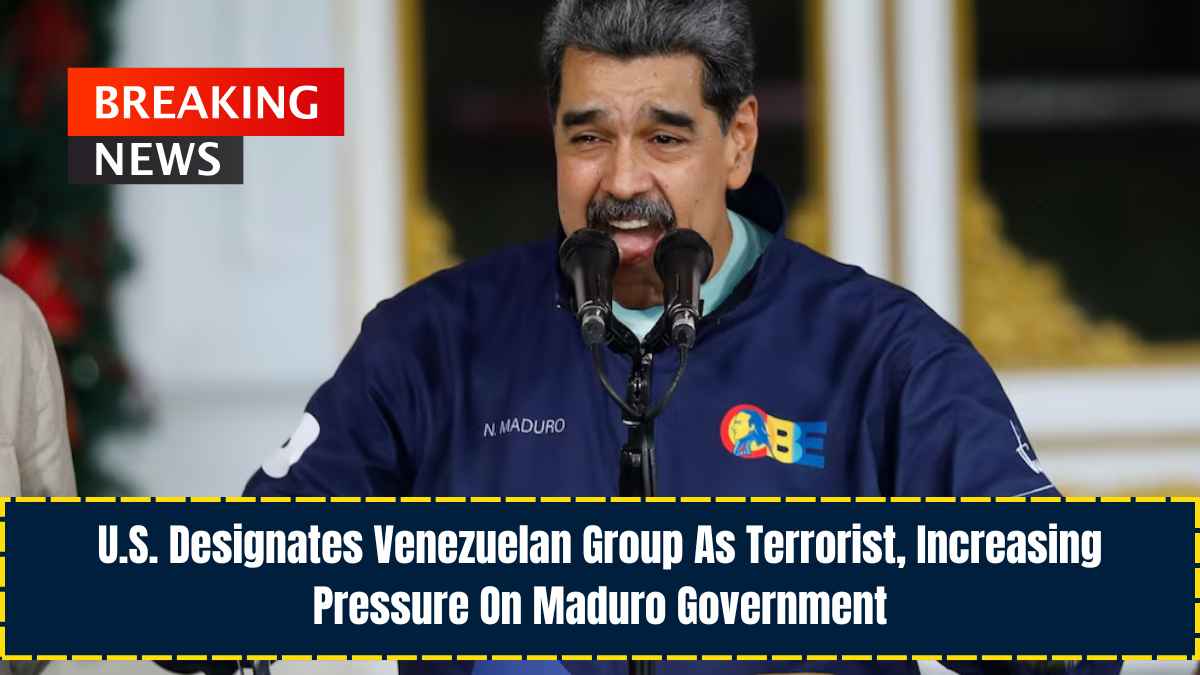The United States on Monday officially named Cartel de los Soles a Foreign Terrorist Organization (FTO), expanding the terrorism-related sanctions already imposed on the group.
U.S. officials have long alleged that the network includes President Nicolás Maduro and several senior Venezuelan military and political figures.
Venezuela’s government sharply rejected the move, calling the U.S. designation “ridiculous” and insisting that the cartel “does not exist.”
Secretary of State Marco Rubio announced earlier this month that the group would be classified as an FTO due to its alleged role in trafficking illegal narcotics into the United States.
Growing Tensions Amid U.S. Military Activity In The Caribbean
Concerns Over Potential Military Use Of The FTO Label
The designation comes as President Donald Trump expands U.S. military operations near Venezuela, prompting fears that Washington could use the FTO label as justification for military intervention.
However, sanctions specialists stress that FTO statutes do not authorize military action.
For months, the U.S. has carried out deadly strikes targeting boats suspected of drug trafficking off the Venezuelan coast and across the Pacific region of Latin America.
Reuters recently reported that Washington is preparing a new phase of operations focused on Venezuelan activity.
Defense Secretary Pete Hegseth stated that the new designation gives the U.S. “a whole bunch of new options.”
U.S. Accusations And Venezuela’s Response
Link To Tren De Aragua
U.S. officials claim that Cartel de los Soles collaborates with the notorious Venezuelan gang Tren de Aragua, which is also tied to Maduro and previously designated as a terrorist organization.
Maduro Denies Criminal Allegations
Maduro’s administration has repeatedly denied involvement in drug trafficking and accuses Washington of engineering a “regime-change agenda” to seize Venezuela’s large reserves of oil, gas, gold, diamonds, iron, and bauxite.
Foreign Minister Yvan Gil condemned the designation on Telegram, calling it a “new and ridiculous fabrication” intended to justify an illegitimate intervention in Venezuela.
Market Reaction And Financial Impact
Venezuelan Bonds Rise Despite Tensions
Despite the diplomatic clash, Venezuela’s defaulted dollar bonds—trading near 30 cents on the dollar—rose by as much as 1 cent on Monday.
Investors have shown increased interest as pressure from Washington intensifies, making Venezuela the best-performing emerging market issuer of the year, with a 96% index-level return, according to JPMorgan.
Previous U.S. Sanctions
In July, the U.S. Treasury labeled Cartel de los Soles a “Specially Designated Global Terrorist”, freezing assets under U.S. jurisdiction and prohibiting Americans from conducting business with the group.
Experts Question The Structure Of The Cartel
Is Maduro Directly Leading It?
According to InSight Crime, calling Maduro the head of the cartel is an oversimplification.
The organization is better understood as a corrupt network in which Venezuelan military and political officials profit through cooperation with drug traffickers.
Analyst Will Freeman of the Council on Foreign Relations stated that although Maduro likely knows about military involvement in cocaine trafficking, no public evidence proves he personally directs or coordinates operations.
Questions Surround U.S. Military Conduct
Debate Over Legality
Experts continue to question the legality of U.S. military strikes in the Caribbean and Pacific, which have resulted in dozens of deaths after U.S. forces destroyed boats believed to be carrying drugs.
A Reuters poll found that only 29% of Americans support using military force to kill suspected drug traffickers without court involvement.
Former Treasury officials noted that FTO designations have never been linked to authorizing military actions, emphasizing that the designation’s primary purpose is to increase criminal liability for anyone who provides material support.
The U.S. decision to label Cartel de los Soles as a foreign terrorist organization marks a significant escalation in its pressure campaign against Venezuela’s government.
While Washington argues the move targets drug trafficking networks tied to Maduro, Venezuelan officials condemn it as a pretext for intervention.
With military activity intensifying and financial markets reacting, the coming weeks will determine whether diplomacy, sanctions, or conflict define the next phase of U.S.–Venezuela relations.




